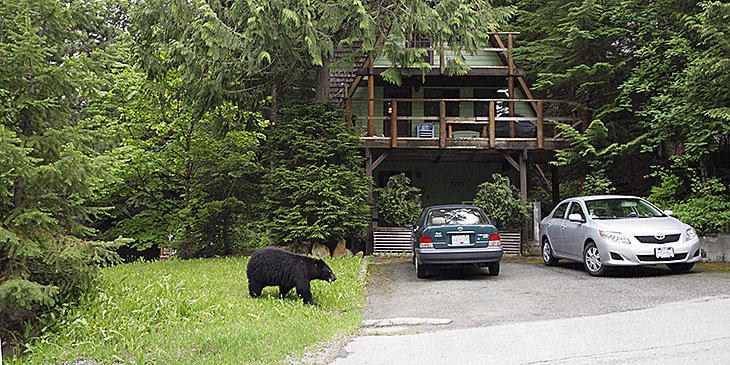To protect bears and other wildlife, the City of Nanaimo, Regional District of Nanaimo, and the Central Island Zone of the BC Conservation Officer Service are urging all residents to stop placing their carts out the night before collection day. Carts should be properly secured on residential property for all non-collection days.
Leaving garbage and organic waste unsecured is a safety threat to both bears and humans. Garbage lures bears, and is the attractant for half of the bear-related problem calls made to the BC Conservation Officer Service. Other attractants include bird seed, fruit trees, pet food and livestock. Once a bear becomes food-conditioned to garbage and other attractants, they associate people with food, and lose their fear of people. Every year in our province, hundreds of bears are destroyed due to human-wildlife conflicts.
Prevention is key to keeping bears and other wildlife safe. Follow these guidelines, especially if you live within or nearby bear-frequented areas:
Keep carts secured on non-collection days:
- Do not set your carts out the night before your collection day.
- Place your carts out at the curb between 5:00-8:00 AM on the morning of your scheduled collection day. • Remove your carts from the curb after they have been collected.
- Store carts in a secured location such as a garage or shed, especially if you live on the outer city limits, in a rural neighbourhood, near a park or in any location that may be close to a wildlife habitat.
Reduce odours in your carts:
- Wrap smelly food in newspaper and freeze until collection day.
- Use vinegar and/or baking soda to naturally eliminate odours.
- Periodically rinse carts with soapy water.
Placing carts out the night before collection day goes against local waste collection bylaws and provincial regulations. Under the BC Wildlife Act, a person leaving attractants accessible to dangerous wildlife may be subject to a $230 fine(s) issued by the BC Conservation Officer Service. In areas frequented by bears, setting carts out the night before collection is considered an offence. Our local Conservation Officers remind us the public is legally responsible to secure their attractants, and not place garbage and compost carts out the night before collection.
When dealing with problem wildlife, early intervention is best. The sooner the BC Conservation Officer Service is made aware of a bear in a neighbourhood, the more likely that there can be a positive outcome for the neighbourhood and the bear. If you observe dangerous wildlife in your neighbourhood, please call the Report All Poachers and Polluters (RAPP) hotline at 1-877-952-7277 (RAPP) or #7277 on the TELUS Mobility Network. For more educational resources, visit the www.WildSafeBC.com website.
Key Points
- Never put your carts out prior to the morning of collection. Setting carts out the night before collection day violates both local government bylaws and the BC Wildlife Act, and can result in a fine.
- Keeping waste carts secure on non-collection days is key to preventing human-bear conflicts. • Everyone has a responsibility to remove or secure attractants to prevent bears from becoming food conditioned.
Caitlin Bickford, Conservation Officer, West Coast Region Conservation Officer Service, BC Ministry of Environment & Climate Change Strategy says “The sooner the BC Conservation Officer Service knows about a bear in an area, the quicker action can be taken to secure attractants and prevent the bear from becoming food-conditioned. Too often people wait until the bear’s behaviour has escalated to the level of being a public safety risk, usually ending with the bear needing to be euthanized.”
Mayor Leonard Krog says we may not think of our garbage cans as life-threatening to bears. “It’s natural to think that a bear in our streets could pose a danger to us, our families, and our pets, but in the case of wildlife, that danger plays out both ways. If a bear recognizes our compost and garbage as an easy food source, chances are it will be put down. That’s a scenario where nobody wins, so let’s work together and keep our garbage secure and odour free.”
Quick Facts
- Every year in our province, hundreds of bears are destroyed due to human-wildlife conflicts. • Garbage and compost is the attractant in over 60% of problem bear reports to the BC Conservation Officer Service.
- Black bears have a keen sense of smell, and can detect food from over one kilometre away.


